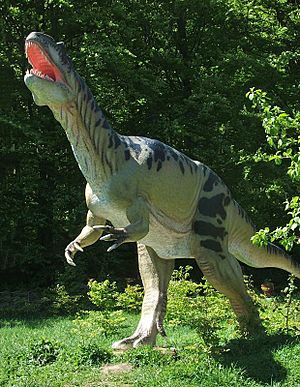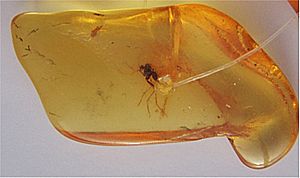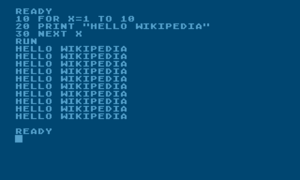Michael Crichton facts for kids
Quick facts for kids
Michael Crichton
|
|
|---|---|
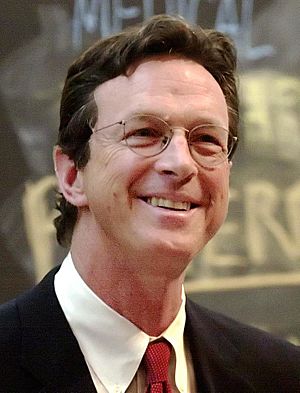
Crichton at Harvard University in 2002
|
|
| Born | John Michael Crichton October 23, 1942 Chicago, Illinois, U.S. |
| Died | November 4, 2008 (aged 66) Los Angeles, California, U.S. |
| Pen name | John Lange Jeffrey Hudson Michael Douglas |
| Occupation | Author, filmmaker |
| Education | Harvard University (BA, MD) |
| Period | 1966–2008 |
| Genre | Action, adventure, science fiction, techno-thriller, historical fiction, drama |
| Spouse |
Joan Radam
(m. 1965; div. 1970)Kathy St. Johns
(m. 1978; div. 1980)Suzanne Childs
(m. 1981; div. 1983)Anne-Marie Martin
(m. 1987; div. 2003)Sherri Alexander
(m. 2005) |
| Children | 2 |
| Signature | |
John Michael Crichton (October 23, 1942 – November 4, 2008) was an American writer and filmmaker. His books sold over 200 million copies worldwide. More than a dozen of his books were made into movies.
Crichton's stories often featured technology. They were usually in the science fiction, techno-thriller, and medical fiction genres. His novels often explored how technology and human actions could go wrong. This often led to big problems, especially with biotechnology. Many of his books had medical or scientific ideas. This was because he had medical training and a science background.
Crichton earned a medical degree (M.D.) from Harvard Medical School in 1969. But he never worked as a doctor. He chose to focus on writing instead. He first wrote under different names. Later, he wrote 26 novels under his own name. Some famous ones include The Andromeda Strain (1969), The Great Train Robbery (1975), Congo (1980), Sphere (1987), and Jurassic Park (1990). Several books were published after he passed away in 2008.
Crichton also worked in movies and TV. In 1973, he wrote and directed Westworld. This was the first movie to use 2D computer-generated imagery (CGI). He also directed other films like Coma (1978). He created the TV series ER (1994–2009). Many of his novels became movies, especially the Jurassic Park series.
Michael Crichton's Life Story
Growing Up and Early Education
John Michael Crichton was born on October 23, 1942, in Chicago, Illinois. His father, John Henderson Crichton, was a journalist. His mother, Zula Miller Crichton, was a homemaker. He grew up in Roslyn, New York, on Long Island.
Michael loved writing from a young age. When he was 14, an article he wrote about a trip was published in The New York Times. He always planned to be a writer. He started studying at Harvard College in 1960.
During his studies, he thought one of his professors was giving him low grades unfairly. To test this, Crichton submitted an essay by the famous writer George Orwell under his own name. The professor gave it a "B−". Crichton later said, "Orwell was a wonderful writer. If a B-minus was all he could get, I thought I'd better drop English." Because of this, he changed his main subject. He earned his bachelor's degree in biological anthropology in 1964.
He later went to Harvard Medical School. Crichton said that after about two weeks, he realized he didn't like medical school. He found that what he truly loved was writing.
Writing Under Different Names
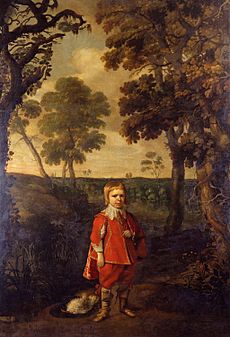
In 1965, while still in medical school, Crichton wrote his first novel, Odds On. He said he wrote it "for furniture and groceries." This book was about a planned robbery that goes wrong. It was published in 1966.
Crichton used the pen name John Lange for this book. He planned to be a doctor and didn't want patients to worry he'd use their stories. The name came from an anthropologist named Andrew Lang. Crichton added an "e" and used his own first name, John. This book was successful enough for him to write more John Lange novels.
His fourth novel, A Case of Need (1968), was a medical thriller. It was different from his other books. So, Crichton used a new pen name: "Jeffery Hudson." This name was based on a real 17th-century dwarf. This novel was important for Crichton's future books. It showed how technology would become a key part of his stories. This book won an Edgar Award in 1969.
Pen Names Michael Crichton Used
- John Lange
- Jeffery Hudson
- Michael Douglas
Early Novels and Movie Scripts
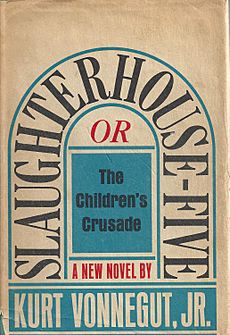
After his third year of medical school, Crichton realized he loved writing most. He started publishing book reviews under his own name. In 1969, he reviewed Slaughterhouse-Five by Kurt Vonnegut.
The first novel published under Crichton's real name was The Andromeda Strain (1969). This book became a huge bestseller. It was about scientists trying to stop a deadly alien germ. Crichton was inspired to write it after reading another book. He worked on it for three years. The book was a big hit right away. Film rights were sold for a lot of money. It was made into a movie in 1971.
Crichton finished medical school in 1969. He did not get a license to practice medicine. He decided to focus on his writing career.
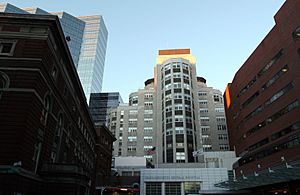
In 1970, Crichton published Five Patients. This non-fiction book was about his experiences in a hospital. It showed problems in healthcare at the time. He also wrote a pilot script for a medical TV series called "24 Hours." This script later became the basis for the famous show ER.
In 1972, Crichton published his last novel as John Lange, called Binary. It was about a villain trying to assassinate the President.
The Terminal Man (1972) was another novel. It was about a man with seizures who has electrodes put in his brain. This book continued Crichton's interest in how machines and humans interact. It was made into a movie in 1974.
Crichton also started directing films. He wrote and directed Westworld in 1973. This was a science fiction western-thriller about robots that go out of control. It was the first movie to use 2D computer-generated imagery (CGI).
Historical Novels and Directing Films
In 1975, Crichton wrote The Great Train Robbery. This book became a bestseller. It was a story about a huge gold heist on a train in Victorian era England in 1855. Crichton researched the historical period carefully for the book.
In 1976, Crichton published Eaters of the Dead. This novel was about a 10th-century Muslim who travels with Vikings. The story was inspired by an old manuscript and the tale of Beowulf.
Crichton wrote and directed the suspense film Coma (1978). It was based on a novel by his friend, Robin Cook. The movie was very popular. Crichton then wrote and directed a movie based on his own book, The Great Train Robbery (1978).
He also wrote the novel Congo, which became a bestseller. It was about an expedition to find a lost city in Africa. A movie version of Congo was made in 1995.
In 1987, Crichton published Sphere. This novel was about scientists exploring a huge alien spacecraft found deep in the Pacific Ocean. It started as science fiction but quickly became a psychological thriller. It explored the nature of the human mind. This novel was made into a movie in 1998.
Jurassic Park and Other Big Hits
In 1990, Crichton published the novel Jurassic Park. This book used a style where fiction felt like fact. It also used chaos theory to explain why an amusement park with dinosaurs goes wrong. The story began as a movie script Crichton wrote in 1983. He thought that creating dinosaurs would come from a "desire to entertain." This led to the idea of a wildlife park with extinct animals.
Steven Spielberg learned about the novel in 1989. This was while he and Crichton were talking about a TV series that would become ER. Before the book was even published, Crichton asked for a lot of money for the film rights. Universal Pictures bought the rights for Spielberg. Crichton also wrote the screenplay for the movie. The film, directed by Spielberg, was released in 1993. It became a huge success.
In 1992, Crichton published Rising Sun. This was a crime thriller about a murder in a Japanese company's headquarters in Los Angeles. It was made into a movie in 1993.
His next novel, Disclosure, came out in 1994. It was also made into a movie the same year.
Crichton created and was an executive producer for the TV show ER. This show was based on his 1974 script. Spielberg helped develop the show.
Crichton then wrote The Lost World in 1995. This was a sequel to Jurassic Park. It was made into a movie in 1997, also directed by Spielberg.
In 1996, Crichton published Airframe. This book was about a problem on an airplane. It continued Crichton's theme of how human mistakes can cause technology to fail. He also co-wrote the movie Twister (1996) with his wife at the time.
In 1999, Crichton published Timeline. This science fiction novel was about experts who time travel back to the medieval period. It combined technical details with action. The book was praised by scholars for its depiction of the Middle Ages. A movie based on the book was released in 2003.
His novel Eaters of the Dead was adapted into the 1999 film The 13th Warrior.
Later Novels and Life
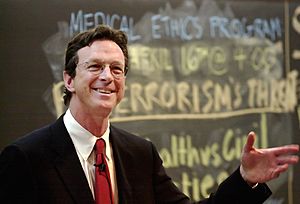
In 2002, Crichton published Prey. This book was about new science and technology, especially nanotechnology. It explored ideas like artificial life and genetic algorithms.
In 2004, Crichton published State of Fear. This novel was about eco-terrorists who try to cause mass murder. Global warming was a main theme in the book. This book became a bestseller.
His last novel published while he was alive was Next in 2006. This book followed many characters, including genetically modified animals. It explored a world with lots of genetic research and corporate greed.
Books Published After His Death
Several novels that Crichton was working on were published after he died.
- Pirate Latitudes was found on his computer. It was published in 2009.
- Micro was about technology that shrinks humans. It was completed by another author, Richard Preston, using Crichton's notes. It was published in 2011.
- Dragon Teeth, a historical novel he wrote in 1974, was published in 2017. It is set during the Bone Wars, a time when scientists were competing to find dinosaur fossils.
- The Andromeda Evolution, a sequel to The Andromeda Strain, was published in 2019. It was a collaboration with another author.
His unpublished works are still being adapted into TV shows and movies. In 2022, it was announced that author James Patterson would co-author a novel based on an unfinished manuscript by Crichton.
Crichton's Work with Computers and Law
Computers and Video Games
In 1983, Crichton wrote Electronic Life. This book taught readers about BASIC programming. It was meant to help people who were new to computers. He explained basic computer words and said that anyone could learn to use computers. He believed that programming a computer would give people freedom.
In the book, Crichton made some predictions about computers. He said that computer networks would become very important for sharing information and pictures. He also predicted that computer games would be popular for a while but then fade.
Crichton also created a graphical adventure game called Amazon in 1984. It sold over 100,000 copies, which was a big success then.
He started a company that sold a computer program he wrote. He used it to help create budgets for his movies. He often used computers in his films. Westworld was the first film to use computer-generated special effects. He also pushed Spielberg to use them in the Jurassic Park movies. For his pioneering use of computer programs in film, he won an Academy Award for Technical Achievement in 1995.
Legal Cases About His Work
Crichton was involved in several lawsuits. Other people claimed they had created ideas that he used in his work. He always won these cases.
For example, in 1996, someone claimed that Jurassic Park copied their dinosaur stories. The court ruled in Crichton's favor. In 1998, a jury decided that the movie Twister was not based on someone else's work.
Michael Crichton's Views and Personal Life
Views on Global Warming
Crichton became well known for questioning the science behind global warming. He spoke about this topic to the U.S. Congress in 2005.
Many scientists disagreed with his views. For example, a scientist named Peter Doran said that Crichton misused his research findings in his novel State of Fear. Al Gore also seemed to refer to State of Fear in a speech. He said that if a doctor tells you your baby has a fever, you don't say, "I read a science fiction novel that tells me it's not a problem."
Writing Style and Themes
Crichton's novels, like Jurassic Park, have been described as similar to adventure stories by authors like Arthur Conan Doyle and Jules Verne. But Crichton added a modern twist with cutting-edge technology. He was known for his storytelling talent.
His works often served as cautionary tales. His plots often showed scientific advancements going wrong. A common theme was the failure of complex systems and their safety measures. This can be seen in Jurassic Park (biological systems), The Andromeda Strain (organization), Airframe (technology), and Westworld (robots). The movie Westworld even had a slogan: "Where nothing can possibly go worng" (sic).
Crichton often used a literary technique called the false document. For example, Eaters of the Dead is presented as a scholarly translation of an old manuscript. The Andromeda Strain and Jurassic Park included fake scientific documents like diagrams and computer printouts.
He also often brought together different experts to solve a unique problem. This happened in The Andromeda Strain, Sphere, Jurassic Park, and Timeline.
Personal Life and Family
As a teenager, Crichton felt isolated because he was very tall (6 feet 9 inches). He practiced meditation for much of his life. He was often seen as a deist, someone who believes in a creator but not organized religion. He never publicly confirmed this. When asked if he was spiritual, he said, "Yes, but it is difficult to talk about."
Crichton was a workaholic. When writing a novel, he would work very intensely. He would wake up earlier and earlier each day as he got closer to finishing a book.
In 1992, People magazine named him one of the 50 most beautiful people.
He was married five times. He had two children. His daughter, Taylor Anne, was born in 1989. At the time of his death, he was married to Sherri Alexander, who was pregnant with their son, John Michael Todd Crichton. His son was born in 2009.
Political Views
From 1990 to 1995, Crichton donated money to Democratic political candidates. He was also a supporter of Ross Perot, a Reform candidate, in the 1996 presidential election.
In a 2003 speech, Crichton warned against political divisions in environmental laws. He argued for an environmental movement that was not tied to politics. In 2005, he reportedly met with Republican President George W. Bush to discuss his novel State of Fear.
Illness and Death
Crichton was diagnosed with lymphoma (a type of cancer) in early 2008. He kept his illness private. He was getting chemotherapy treatment and his family expected him to recover. He passed away at age 66 on November 4, 2008.
Crichton had a large collection of 20th-century American art. It was sold at auction in 2010.
Michael Crichton's Speeches
Crichton was a popular public speaker. He gave many notable speeches, especially about Global Warming.
"Intelligence Squared Debate"
In 2007, Crichton took part in a debate in New York City. The topic was "Global Warming Is Not a Crisis." He was on the side arguing that global warming was not a crisis. The audience's opinion shifted significantly after the debate, suggesting his group had won.
Other Important Speeches
- "Mediasaurus: The Decline of Conventional Media" (1993): Crichton predicted that traditional media would decline.
- "Environmentalism as Religion" (2003): Crichton explained his view that religious approaches to the environment are not helpful.
- "Science Policy in the 21st century" (2005): He talked about issues in science policy.
- "The Case for Skepticism on Global Warming" (2005): Crichton explained why he questioned common views on global warming. He argued that claims of big warming caused doubt.
- "Caltech Michelin Lecture" (2003): Titled "Aliens Cause Global Warming," this speech connected science fiction ideas to global warming science.
- "Testimony before the United States Senate" (2005): Crichton was invited to speak to the Senate as an expert on global warming.
- "Complexity Theory and Environmental Management" (2005): He explained why complexity theory is important for managing the environment.
- "Genetic Research and Legislative Needs" (2006): Crichton talked about why laws about genetic research needed to be updated.
The Gell-Mann Amnesia Effect
In a 2002 speech, Crichton created the term Gell-Mann amnesia effect. He named it after physicist Murray Gell-Mann. This term describes how people might read a news article about a topic they know well and notice mistakes. But then they read another article about something they don't know well and believe it completely.
Michael Crichton's Legacy
In 2002, a type of ankylosaurid dinosaur was named in his honor: Crichtonsaurus bohlini. Later, another dinosaur, Crichtonpelta benxiensis, was also named after him.
His stories continue to be made into films and TV shows. This makes him one of the highest-earning story creators of all time.
See also
 In Spanish: Michael Crichton para niños
In Spanish: Michael Crichton para niños


